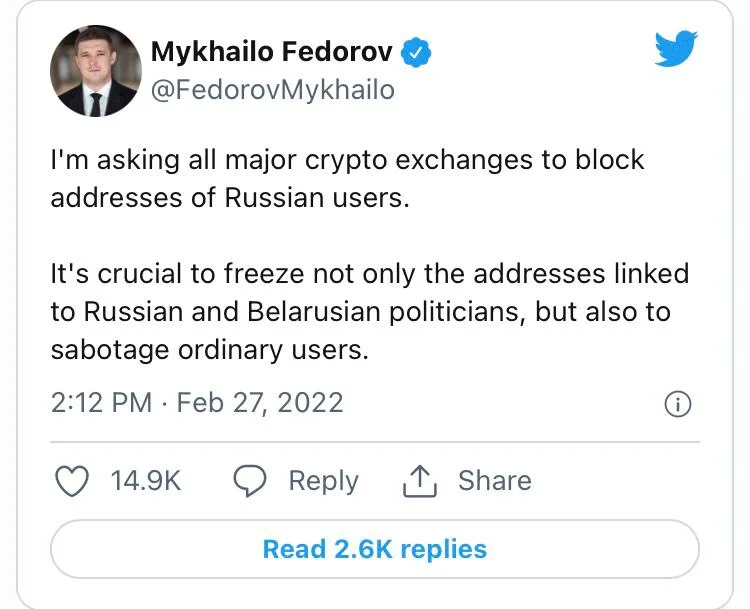
Binance is reputed as one of the world’s leading crypto exchanges, and its boss strikes out the restrictions placed on Russians to use cryptocurrency.
Many ordinary Russians do not want war, according to Changpeng Zhao, founder and CEO of cryptocurrency exchange Binance, who spoke on BBC Radio 4’s Today program.
Ukraine has requested that major cryptocurrency exchanges prohibit Russian users from using their services.
One financial analyst expressed concern that the debate could devolve into a “crypto war.”
On Sunday, Ukraine’s Deputy Prime Minister, Mykhailo Fedorov, requested that major cryptocurrency exchanges restrict the addresses of ordinary Russian users, rather than just politicians, in a tweet posted to his followers.

According to the Reuters news agency, the Bitcoin price has increased by 13 percent since Russia’s invasion of Ukraine began in April.
There have been a lot of rumors. In order to dodge sanctions and other constraints, Russian oligarchs may be putting their money into crypto-currencies.
Bitcoin was referred to as “Putin’s sanctions-busting superweapon” by the British publication The Telegraph.
Mr Zhao, on the other hand, stated: “We have no animosity toward any particular group of individuals.
“We make a distinction between the Russian leaders who launch wars and the average Russian citizen.
“A large number of ordinary Russians are opposed to war.”
“We have no influence over the industry.
“I’m willing to share my sanction list, and you’re welcome to publish yours.
“What’s more, guess what? No one else is going to follow in your footsteps.
“It only serves to divert Russian consumers to other, more niche networks.”
Financial Freedom
Binance stated in a statement made earlier this week that it would not unilaterally freeze the accounts of millions of “innocent consumers.”
In a statement to BBC News, the corporation stated that “crypto is intended to enable greater financial independence for people all around the world.”
Any unilateral ban would be a “slap in the face” to the very reason cryptography was invented.
The government, on the other hand, was taking the steps necessary to impose sanctions “while minimizing the impact on innocent users.”
‘Libertarian principles’
Mr Zhao expressed himself as follows: “There are, I believe, a few hundred individuals in Russia who are listed on the international sanctions list – the majority of them are politicians and other officials.
“That is something we adhere to to the letter.
“In addition, we are not in a position to penalize entire communities of individuals.
“We are not political in nature; we are opposed to war, but we are here to assist the general public.”
An investigation by Vice News found that several other cryptocurrency exchanges have likewise ruled out the possibility of freezing all Russian account balances.
For example, Kraken’s chief executive Jesse Powell has stated that the company’s platform will not freeze Russian accounts, as doing so would be in violation of Bitcoin’s “libertarian values.”

To be sure, Tom Keatinge, director of the Centre for Financial Crime and Security Studies (CFCS), a think tank affiliated with the Royal United Services Institute (RUSI), cautioned that exchanges that did not adhere to the guidelines could be barred from accessing financial services in the future.
According to him, “those institutions that provide services to cryptocurrency exchanges will be examining their clients’ operations very closely to verify that they are dutifully applying the checks necessary by the expanding sanctions regimes against Russia.”
It is possible that the war in Ukraine will be remembered as the first meaningful “crypto conflict,” according to Mr Keatinge, who told BBC News that those seeking to “evade sanctions, protect their savings, or avoid re-entering a collapsing banking system will turn to cryptocurrencies for solutions.”
According to a research published prior to the invasion by blockchain data company Chainalysis, criminals laundered $8.6 billion (£6.4 billion) in cryptocurrency in 2021, a 30 percent increase from the previous year’s figures.
According to the Financial Times, “Trading between the Russian rouble and digital assets such as Bitcoin and Tether has more than doubled since the beginning of the Ukrainian offensive, hitting $60 million every day.”
Crackdown
The surge comes at a time when governments are attempting to isolate Russia from the global financial system.
According to reports published on Tuesday, the British government has announced new steps to combat money laundering by Russian “oligarchs and kleptocrats,” including new authority to seize cryptocurrency holdings.
As Caroline Malcolm of Chainalysis said to BBC News, “Russian oligarchs might use crypto-currency to circumvent the sanctions in the same way they did with the traditional financial system.”
However, it was unlikely that sanctioned individuals would be moving huge amounts of cryptocurrency at this time.
According to her, “Russia’s elite and financial agencies have been prepared for sanctions for a long period of time.”
The use of cryptocurrency to escape sanctions relating to this issue is possible, but it is likely to have happened gradually over a period of several months, according to the report.
Moreover, analytics techniques employed for money tracking proved to be more effective than those “capable of interfering with Russian efforts to circumvent sanctions by using a network of traditional bank wires or physical currency to do so.”
According to Tom Robinson, CEO of blockchain research business Elliptic, cryptocurrency might be a desirable shelter for oligarchs’ riches because it cannot be confiscated and no one can prohibit it from being moved.
However, because money was “very traceable,” it would be “impossible for them to spend it anywhere where sanctions are in effect.”
